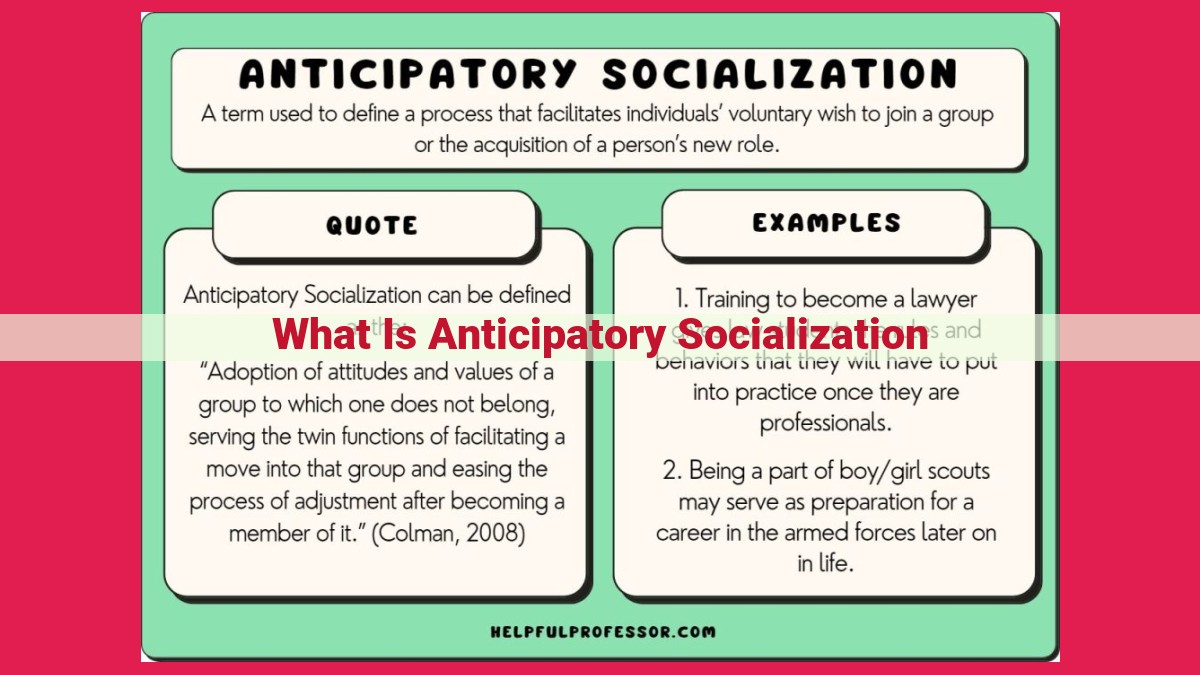Anticipatory Socialization: A Guide To Future Social Integration And Enhanced Performance

Anticipatory socialization is the process of preparing individuals for future social groups by internalizing norms and expectations. It occurs through play, internships, and other experiences that provide a framework for behavior and reduce uncertainty about future roles. By anticipating future expectations, individuals can transition smoothly into new groups, enhance their performance, and foster increased motivation.
Anticipatory Socialization: The Key to Seamless Transitions and Reduced Uncertainty
As we navigate life’s ever-changing social landscape, we encounter countless new groups and situations. Anticipatory socialization is the invaluable process that prepares us for these transitions, equipping us with the knowledge and expectations necessary to thrive in unfamiliar environments.
Imagine yourself as a child, eagerly anticipating your first day of school. Through play and interactions with older siblings or peers, you gain a glimpse into the norms and behaviors expected in a classroom. This anticipatory socialization helps you ease into the transition, reducing anxiety and fostering a sense of comfort in your new role as a student.
As we progress through adulthood, anticipatory socialization continues to play a pivotal role in our social interactions. Whether we’re embarking on a new career or joining a social club, it provides us with a framework for understanding the expectations and values of the group. By internalizing these norms, we become better equipped to navigate these unfamiliar situations, increasing our chances of success and satisfaction.
Underlying Concepts of Anticipatory Socialization
In the realm of social development, anticipatory socialization plays a pivotal role in shaping our understanding and expectations as we navigate future social groups. This process is rooted in the fundamental concept of socialization, the lifelong journey of internalizing societal norms and values. Through interactions with family, friends, educational institutions, and the broader community, we gradually absorb the unwritten rules and expectations that govern our behavior.
Socialization: The Lifelong Learning Process
Socialization is an ongoing process that begins in infancy and extends throughout our lives. From the moment we are born, we are immersed in a social world where our parents and caregivers shape our perceptions and teach us how to interact with others. As we grow and encounter new environments, such as school and the workplace, we continue to adapt and modify our behavior to conform to the norms of these settings.
Reference Groups: Standards for Self-Evaluation
In the process of socialization, we identify with certain reference groups that serve as standards for self-evaluation. These groups can be based on shared values, beliefs, or experiences, such as our family, peers, or colleagues. By comparing ourselves to others within these groups, we develop a sense of our own worth and belonging.
Roles and Statuses: Shaping Expectations
Within social groups, individuals occupy specific roles and statuses that carry certain expectations. A student is expected to behave differently from a teacher, and a manager is expected to exhibit different levels of authority than a subordinate. By internalizing the norms associated with these roles and statuses, we learn how to fulfill our responsibilities and interact appropriately with others.
Contexts of Anticipatory Socialization
Anticipatory socialization plays a crucial role in preparing individuals for joining new social groups. From the tender age of childhood, play serves as a powerful form of anticipatory socialization. Children engage in imaginative scenarios, embodying different roles and situations, which allows them to internalize norms for future interactions within society.
Career paths present another prime example of anticipatory socialization. Internships and extracurricular activities offer invaluable opportunities for individuals to gain practical experience and develop the necessary skills for their future professions. By immersing themselves in these settings, individuals can preview the expectations and responsibilities of their desired career, reducing uncertainty and increasing their preparedness.
Benefits of Anticipatory Socialization
- Discuss how it facilitates smooth transitions by providing a framework for behavior.
- Explain the reduction of uncertainty by understanding group expectations.
- Emphasize the improved performance and motivation it fosters.
Benefits of Anticipatory Socialization
In the tapestry of life, we navigate a myriad of social groups, from our family and friends to our workplaces and communities. Anticipatory socialization serves as a guide, preparing us for these transitions and reducing the uncertainties that accompany them.
One of the most significant benefits of anticipatory socialization is its ability to facilitate smooth transitions. By providing a framework for behavior, it equips us with the knowledge and skills necessary to navigate new social settings. Like a roadmap, it charts a path through the often-unfamiliar terrain of unfamiliar groups, allowing us to find our footing and establish meaningful connections.
Furthermore, anticipatory socialization reduces uncertainty. By understanding the expectations and norms of a future group, we gain a sense of predictability and control. This clarity dispels the anxiety associated with the unknown, allowing us to approach new situations with confidence and purpose. It’s like having a preview of the movie, giving us a glimpse into the characters, plot, and ending, so we can fully appreciate the unfolding story.
Perhaps most importantly, anticipatory socialization improves performance and motivation. When we know what is expected of us, we can prepare accordingly and set realistic goals. It provides a yardstick against which we can measure our progress and identify areas for improvement. This clarity fosters a sense of accountability and drives us to excel, both individually and as a member of the group. It’s like having a coach or mentor who believes in our potential and encourages us to reach for the stars.
In conclusion, anticipatory socialization is an invaluable asset in our social journey. By providing a framework for behavior, reducing uncertainty, and improving performance, it equips us to navigate the complexities of social life with confidence and grace. It is a catalyst for successful integration and a cornerstone of our ability to thrive in diverse social environments.